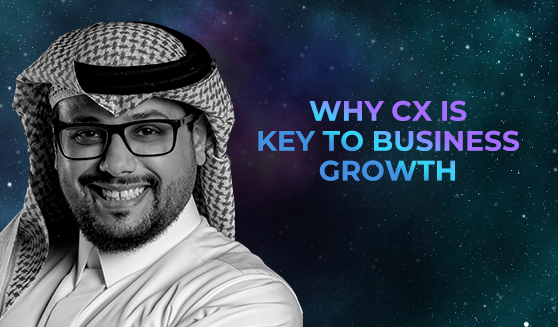
Abdullah Al Asiri (Founder and CEO at Lucidya) started his keynote at #LEAP22 with a story that warmed our hearts. “Four years ago,” he began, “I was invited to speak at an event in Portugal.”
He took a flight to land the same day as the conference, and as it was a long journey he decided to wear comfortable clothes – his pyjamas, basically. On arrival at the airport in Lisbon he waited for his luggage. And waited. And waited.
Eventually, he went to the airline’s customer services desk. He was greeted by a smiling customer service agent who assured him she’d take care of him. After entering his name into the system, she immediately said, “Oh! It’s your birthday in two weeks,” and wished him a happy birthday before offering him a latte – skimmed milk, no sugar, just how he liked it.
Then she said she’d arrange for his luggage to be delivered to his hotel, and would contact him via WhatsApp (his preferred communication method) in his own language to let him know when that was going to happen.
While that was all fine, Asiri still had a problem: he was going straight to the conference and he was still wearing his pyjamas. So the customer service agent gave him a voucher and arranged a car to take him to the mall, where he bought a new suit (nicer than the one he’d brought with him).
“I went to the conference and gave the best speech ever, because I was happy,” he said. “The experience was amazing.”
Except…none of this was true. Except the bit about his luggage not showing up. What really happened was the complete opposite: the customer service agent was rude, repeatedly asked him for the same information, and he ended up going to the conference in his pyjamas and giving a speech he wasn’t proud of.
In either scenario, Asiri would’ve talked about his experience to his friends and colleagues. The first scenario would’ve been great for the airline, as well as for him – he would have told everyone how brilliant they were and they might’ve gained new business as a result. The second scenario, however, was not a good advertisement for the airline.
What’s this got to do with tech?
There’s a huge body of research that shows customer experience (CX) is absolutely key to business success. According to pwc, 32% of global customers would never again buy from a brand they loved after just one bad experience. This is heightened in some regions – in Latin America for example, 49% would be driven away by that one bad experience; and in the US, 59% would abandon even their most loved brands after a series of bad interactions.
A study by experience management firm Walker found that by the end of 2020, customer experience had overtaken both price and product as the key brand differentiator. And according to research by another management consulting company, North Highland, 87% of senior business leaders in the US and UK see CX as their top driver of growth – but only 1 in 3 feel prepared to address it.
On the flipside, research by McKinsey found that when a business provides an exceptional customer experience, it can expect to thrive – and increase revenue by about 10%, while cutting costs by around 25%.
“This is not new,” Asiri said, “businesses know this. I’m sure the management of that airline company wanted to provide a better customer experience for me. But they’re not able to do so — they don’t have the right tools in their hands to deliver that.”
That’s the problem. Businesses simply aren’t able to deliver exceptional CX at the scale required by today’s markets. Technologies to enable this have existed for some time now, but they’re not accessible: they’re “too expensive, they’re too complicated to set up…and they are actually stupid tools. Because they’re not smart.”
Crucially, many of the CX tools that have been available to businesses in recent years have been reactive, not proactive. They can solve problems when they come up, but they don’t streamline the experience and prevent issues from arising from the start. For this reason, Asiri said, “Customer experience is broken.”
Digital transformation is enabling a new CX journey
“Things have started to change,” Asiri noted. And he credited this change to COVID-19 and the shift to digital: changing consumer behaviour, from offline to online, means that high quality CX tech can now be made accessible and enable positive experiences to be provided at scale.
When more customer-to-brand interactions take place online, those interactions can be analysed and automated.
“This was the missing part that would allow us to develop a next generation of customer experience technologies that fix customer experience as we know it today.”
Experiences can be recorded and measured as they happen, and the experience of the next steps in each customer’s journey can be predicted – and personalised.
And as a result, Asiri said:
“We will witness a new generation of customer experience technologies that will fix the problem. These technologies will be so powerful that dreams will become true. In this field, people are dreaming of delivering something called personalisation at scale — which means sending the right messages to the right customers, at the right time, through the right channel.”
With businesses and consumers interacting largely (or exclusively) in digital and hybrid spaces, this tech will be accessible to a much wider set of businesses. It’ll be easier to set up, cheaper than previous technology, and it’ll provide an experience that will make every customer feel seen, heard, and cared for.
This is important to consumers for obvious reasons. They’ll be better understood, and better served.
And it’s important for companies to get on board with right now: because those that don’t will be left behind. The businesses that leverage digital CX tech early will disrupt the landscape. They’ll make their customers happy. And the long-term result of that will be customer loyalty and growth in sales – creating a stable business that can ride the waves of uncertainty and global change, for years to come.








